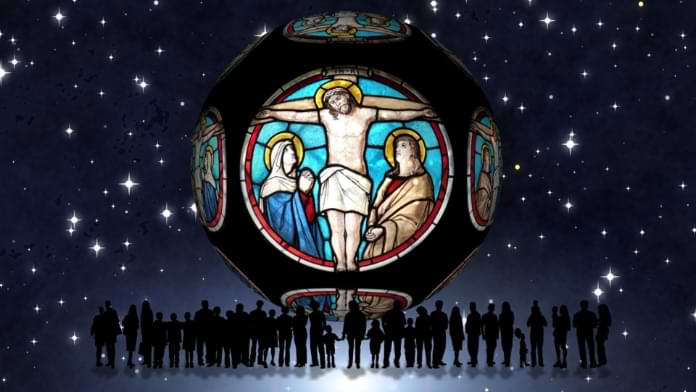The beginning of the school year and the onset of fall may put us in mind to reconsider our priorities, refocus on our purpose and get reacquainted with our routines. Even if we have the privilege of being retired, the changing of the seasons affords an opportunity for reflection on our life’s direction and purpose. In that spirit, it seems to me to be a good time to reflect as well on the direction and purpose of our life together as Central Congregational Church.
In Matthew chapter 16, we find Jesus with his disciples in the city of Caesarea Philippi in the northern part of Israel – a strategic outpost of the Roman Empire, to the point of the title, Caesar, being appended to the original name of the city. It is not an accident that it is in this location that Jesus questions his disciples as to what the word on the street is about who Jesus really is, as by then Jesus’ teaching and miracles had gained him widespread notoriety.
After the disciples report on what they’ve heard about Jesus through the local gossip – including that Jesus is the reincarnation of John the Baptist, Elijah or Jeremiah – Jesus more pointedly asks his closest followers, “But what about you?... Who do you say that I am?” At which point the Apostle Peter unsurprisingly speaks out boldly for the whole group by declaring that Jesus is “the Messiah, the Son of the living God”. Then, after noting that Peter and the disciples didn’t come to this accurate conclusion by their own wisdom but rather by revelation from God, Jesus makes a bold and revolutionary pronouncement. In the very shadow of the Roman Empire, Jesus affirms that he is indeed the Son of God – which also makes him the rightful ruler, not Caesar – and that upon Peter’s confession of this fact and Jesus’ followers continued confession of his Lordship throughout the centuries, he will build his church, “and the gates of hell will not overcome it”.
In the immediate context of Jesus’ declaration, many of his followers including the twelve disciples, a diverse, rag-tag group of Jewish men living their lives under Roman oppression, may have quickly associated the gates of hell with the Roman Empire. This is a fair assessment of his followers' mindset as is borne out by their actions and questions later in the gospels and in Acts.
First, in a dramatic shift of loyalty, the large crowd that welcomed Jesus into the city of Jerusalem at Passover shouting “Hosanna, blessed is he who comes in the name of the Lord”, (Matthew 21:9), is the same mob that a few days later is stirred up by the religious leaders to demand Jesus’ crucifixion from Pilate. Jesus not only grossly offended their religious sensibilities by driving the money changers out of the temple, but showed no sign whatsoever of marshaling a militia and using his supernatural power to overthrow the brutal Roman authorities in Jerusalem, as many before and after Jesus had tried and failed to do.
Less dramatically, but no less misguided, after his resurrection the disciples press Jesus with the question, “Will you at this time restore the kingdom of Israel?”, demonstrating clearly that they continue to see Jesus as an imminent Jewish revolutionary hero who will burst through the gates of hell and overthrow their Roman oppressors. It wasn’t until the outpouring of the Holy Spirit at Pentecost recounted in Acts chapter two that the disciples finally came to understand that Jesus’ mission was not to violently overthrow the brutal but temporary Roman government or any other transient earthly power for that matter, but to confront and permanently defeat Satan and his cohorts, the powers behind the powers, by his sacrificial death and resurrected life. Since the time of Jesus and up to the present day, people continue to claim the name of Jesus while disregarding the way of Jesus. We tend to want the power of resurrection without the sacrifice of the cross.
In considering Jesus' declaration that he would build his Church, I am convinced that this is what he is doing with us – this expression of his body that we call CCC. None of us, including and especially me as the pastor, are here by our own design. Rather, Jesus has brought us and is building us together by his power for his purpose to join with his Spirit in assailing the Gates of Hell— “the spiritual forces in high places” as the Apostle Paul says in Ephesians six. And by his grace, he is teaching us that it is through the power of sacrificial love for each other and our neighbors near and far, be that geographically, religiously or politically, that we break down the Devil's strongholds and transform the world.
As we head into a change of seasons and into a cantankerous and possibly dangerous election cycle, I pray that as individual followers of Jesus and as a church family we will continue to commit ourselves to be first and foremost people of prayer – people whose priorities, purpose and routines are transformed by the purifying presence and power of the Spirit of Jesus Christ, as were the original disciples on the day of Pentecost. I pray that we can embody the fact that our personal and political struggles are spiritual in nature and that ultimately the power of the cross defeats the power of the sword – be that the sword in our hands or, more likely, the sword in our mouths. I pray that we will cooperate with the Spirit of Jesus as he continues to build us into his Church – a people that truly and consistently work together in his name and way for the Glory of God and the Good of Our Neighbors near and far.
—Pastor Scott


